
The lottery is a game of chance in which winners are selected randomly. Prizes can range from cash to goods. Some lotteries offer a fixed amount of money, while others guarantee a percentage of the receipts from ticket sales. Lottery organizers can choose how much to spend on the prizes, but they must ensure that they have enough revenue to cover the total prize fund and still earn a profit.
Lottery is a popular activity that contributes to billions of dollars in revenues annually in the U.S. Some people play for fun while others believe that the lottery is their ticket to a better life. Regardless of your motivation, it is important to understand how the odds work in order to maximize your chances of winning.
In the United States, 44 of the 50 states run a lottery. There are also state-sponsored lotteries in Puerto Rico, the Virgin Islands and Guam. In addition, many countries run national lotteries. In general, lottery revenue is a major source of government income. This revenue is used to support public projects such as schools and other educational programs, as well as a variety of social services.
While the majority of state governments encourage gambling, some legislators have questioned whether lotteries should be promoted as a means to fund government programs. Some critics point to the fact that lotteries promote gambling and divert money from other government needs. Others argue that the government should not be in the business of promoting vices. However, most people who play the lottery do so because they enjoy the thrill and the fantasy of becoming wealthy.
A recent study found that more than 70 percent of lottery ticket purchases are made by a small group of regular players. The authors call these “super users,” and they suggest that the lottery is relying too heavily on them for its profits. This may have contributed to the recent increase in lottery-related problems, such as addiction and other forms of problem gambling.
To keep their tickets sales going strong, state governments must pay out a substantial portion of the proceeds as prizes. This cuts into the percentage of lottery revenue that can be used for public services like education. In addition, the high prize payouts can attract illegal activities and lead to other problems.
The term “lottery” first appeared in English around 1569, although its roots are more ancient. The word is believed to have been derived from Middle Dutch loterie, which may be a calque of Middle French loterie. Lotteries were originally private games of chance that were held at dinner parties. The hosts would give each guest a ticket, and the prizes could include fancy items such as dinnerware.
In colonial America, lotteries were a major source of private and public finance for many types of ventures. For example, they were used to finance roads, canals, colleges, churches and even military campaigns. The lottery was also a popular way for people to raise money for local charities.
